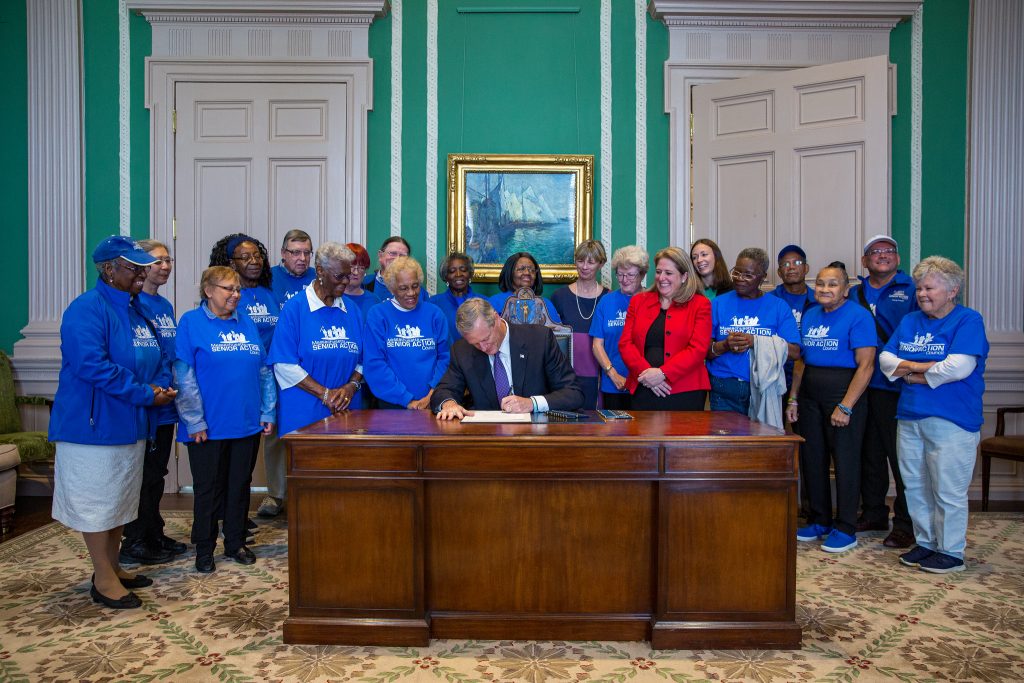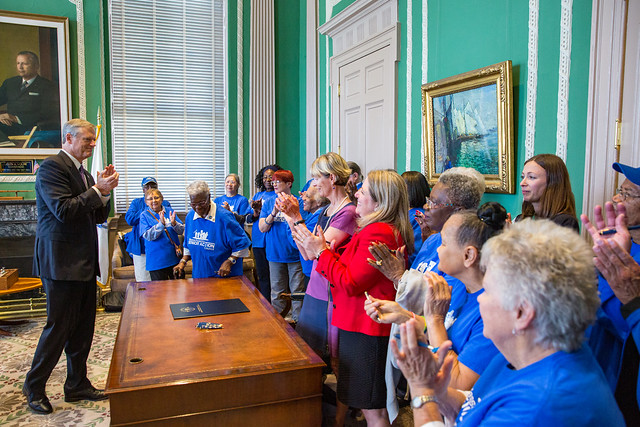Governor Joins Advocacy Group Leaders to Mark Passage of Prescription Drug Pricing, Medicare Savings Sections

Governor Charlie Baker today joined Health and Human Services Secretary Marylou Sudders and leaders of health care advocacy organizations for a ceremonial signing of key sections of the Fiscal Year 2020 (FY20) budget that aim to create health care savings for individuals and the Commonwealth. The Governor and Secretary were joined by Amy Rosenthal, Executive Director of Health Care for All (HCFA), and Edna Pruce, President of the Mass. Senior Action Council (MSAC) and several older adults affiliated with MSAC.
The ceremonial bill signing marks the enactment of two sections of the FY 2020 budget: (1) reforms that allow MassHealth to directly negotiate with drug manufacturers, establishing enhanced accountability and transparency of drug prices and incorporating drug manufacturers into public processes similar to those that already exist for health care providers and health plans in Massachusetts; and (2) a measure that authorizes expanded eligibility for the Medicare Savings Program, which will bring more than $100 million in federal subsidies directly to roughly 40,000 low income older adults and people with disabilities to significantly reduce their health care costs.
 “These sections of the FY20 budget make important reforms that aim to reduce prescription drug costs and expand eligibility for the Medicare Savings Program,” said Governor Charlie Baker. “We are grateful for our partners in the advocacy community and in the Legislature for working with us to enact these important initiatives.”
“These sections of the FY20 budget make important reforms that aim to reduce prescription drug costs and expand eligibility for the Medicare Savings Program,” said Governor Charlie Baker. “We are grateful for our partners in the advocacy community and in the Legislature for working with us to enact these important initiatives.”
“By enacting these reforms to enable MassHealth to negotiate directly with drug manufacturers and implementing a public accountability process, we have created a framework to make a real difference when it comes to controlling rising drug costs,” said Health and Human Services Secretary Marylou Sudders. “Additionally, expanding eligibility to the Medicare Savings Program will significantly reduce health care costs for tens of thousands of individuals, providing thousands of dollars in out-of-pocket savings and promoting economic security.”
“Health Care For All frequently hears from community members and HelpLine callers who are struggling to afford the medications they need. We also know that MassHealth, a program that is critical for our most vulnerable residents, has seen a near doubling of prescription drug costs in just five years,” said Amy Rosenthal, Executive Director of Health Care For All. “Giving MassHealth the tools they need to negotiate lower drug costs makes Massachusetts a national leader. We are very thankful to Governor Baker and Secretary Sudders for their leadership and partnership in getting this important provision over the finish line. We also deeply appreciate the work of legislative leaders and the budget conferees. We look forward to implementing this provision and taking the next steps to bring down prescription drug costs for those with private insurance.
“No senior should have to choose between the cost of medication and the food they need. Unfortunately, that is the case for far too many across the Commonwealth,” said Edna Pruce, President of the Mass. Senior Action Council. “This is a historic moment because expanding the Medicare Savings Programs will go a long way to change that for 40,000 seniors. We look forward to continuing work with Governor Baker and Secretary Sudders to strengthen the health and economic well-being of all seniors in Massachusetts.”
FY20 Budget Health Care Measures
MassHealth Pharmacy Reforms
Through reforms proposed by the Baker-Polito Administration and enacted by the Legislature, the FY20 budget authorizes MassHealth to directly negotiate with drug manufacturers while maintaining coverage for members. The reforms establish enhanced accountability and transparency of drug prices and incorporate drug manufacturers into public processes similar to those that already exist for health care providers and health plans in Massachusetts.
The reforms give MassHealth greater negotiating leverage for prescription drug prices, including authority to engage in:
- Direct Negotiations: Gives MassHealth authority to negotiate supplemental rebate agreements, including value- or outcomes-based contracts, directly with drug manufacturers.
- Public Process: If direct negotiations are unsuccessful and the drug costs at least $25K person/year or $10M in the aggregate annually, MassHealth can establish a target value for a given high-cost drug through a public process, similar to the rate-setting process that exists for most other services that MassHealth covers.
- Health Policy Commission (HPC) Accountability Process: The reforms also leverage features of existing HPC processes and oversight tools for health care providers and payers to hold drug manufacturers more accountable.
Additionally, MassHealth is implementing requirements to limit and make more transparent Pharmacy Benefit Manager (PBM) margins and “spread pricing” within its ACOs and MCOs. Together, these MassHealth pharmacy initiatives are projected to save the Commonwealth $80 million in FY20.
Medicare Savings Program Changes
Through reforms proposed by the Baker-Polito Administration and enacted by the Legislature, the FY20 budget authorized expanded eligibility for the Medicare Savings Program.
The Medicare Savings Program (MSP), also known as “MassHealth Buy-In”, helps low-income older adults and people with disabilities pay for their health care costs. Under the MSP, MassHealth and the federal government share the cost of assisting older adults and people with disabilities with premiums and out-of-pocket costs in Medicare Parts A and B, which cover hospital and medical services. MSP participants also automatically qualify for federal subsidies for pharmacy coverage through Medicare Part D, which eliminate premiums, deductibles, and most cost-sharing.
Starting January 1, 2020, income eligibility will be expanded for the MSP program from 135% FPL to 165% FPL and the asset limit for MSP will be doubled. The expansion will significantly reduce Medicare costs for ~40,000 individuals, providing thousands of dollars in out-of-pocket savings on average per year to promote economic security.
The expansion generates over $100 million in federal subsidies that will flow directly to low income older adults and people with disabilities, with a new state investment of $7 million net annually ($4 million in FY20). The $100M in federal subsidies directly to older adults and individuals with disabilities comes from increasing the number of individuals eligible for federal Medicare Part D subsidies.
